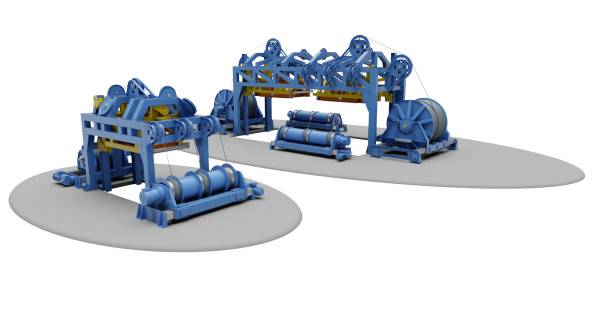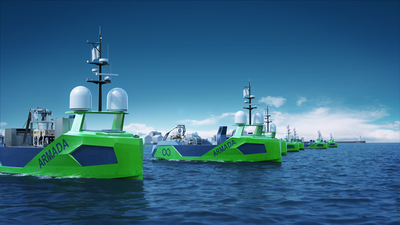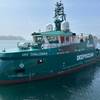Kongsberg's LARS for Ocean Infinity's Armada Robotic Ships
Norway's Kongsberg Maritime has signed its first contract for its ROV launch & recovery system (LARS) specifically designed to handle remotely operated vehicles (ROVs) from unmanned vessels.
The contract has been signed with Ocean Infinity, who will install the system on their Armada fleet of robotic ships.
To remind, US-based seabed survey and ocean exploration company Ocean Infinity in February launched Armada, a new marine technology and data company boasting the industry's largest fleet of unmanned surface vehicles (USV).
Armada, with a focus on combining technology and environmental sustainability, will initially add 15 bespoke designed marine robots to Ocean Infinity’s current fleet of autonomous underwater vehicles (AUV).
Commenting on the LARS deal, Kongsbers says its LARS is an essential component in a system designed to ensure that no people are required at sea while carrying out subsea operations.
"This innovation enables the deployment of remotely operated vehicles (ROVs) and autonomous underwater vehicles (AUVs) by teams based onshore," Kongsberg explains

Caption: Kongsberg Lars - Credit: Kongsberg
The system uses a pure electric drive system, making it more environmentally sustainable and significantly reducing the need for maintenance. Launch & recovery will happen through the moon pool, with the release and capture of the ROV occurring beneath the sea surface. This eliminates the possibility of damage to the ROV from impact with the vessel hull. Another benefit is that launching and recovery can be carried out in higher sea states," Kongsberg says.
Lisa Edvardsen Haugan, Executive Vice President, Deck Machinery & Motion Control, Kongsberg Maritime: "We believe this will be a game-changer.”
"The cost of ROV operations can be drastically decreased through the use of this system. We expect to see more companies transition to using unmanned vessels to reduce operational costs and increase safety."
Armada’s fleet is currently under construction and is expected to be deployable by the end of 2020.
Each unmanned surface robot will serve a wide range of industries by being fully equipped to perform a multiplicity of offshore data acquisition and intervention operations down to a depth of 6,000 meters.
These robot ships will be capable of remotely deploying a wide range of the latest sensors as well as AUVs and remotely operated underwater vehicles (ROV) for visual and acoustic data acquisition.
Armada’s fleet will require neither people on board nor a host vessel nearby. Instead, the vessels will be controlled and operated by experienced mariners via satellite communications from onshore facilities in both Austin, Texas, and Southampton, England.
The fleet approach produces up to 90% less CO2 than other conventional survey vessels, Ocean Infinity said.













